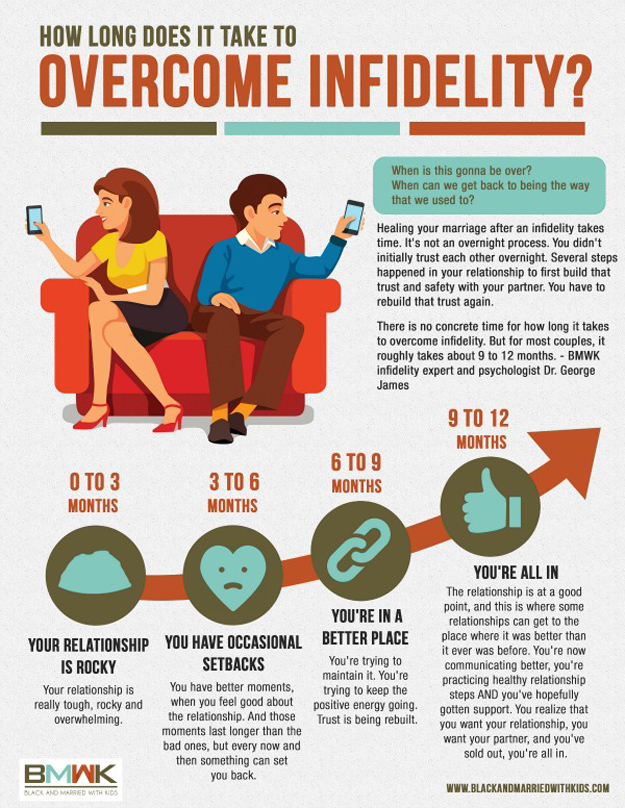Learning how to get over cheating is difficult. You’ve decided to forgive your spouse’s betrayal, but the wounds still run deep. You’ve taken the initial steps to move forward, including uncovering the reasons for why your spouse cheated (which we explored in Part 1 of our three-part infidelity series). But now, you’re wondering what’s next. To learn how to get over an affair, read on.
In this article:
- The Healing Period
- Phase 1 (Admission to 3 Months)
- Phase 2 (Months 3 to 6)
- Phase 3 (Months 6 to 9)
- Phase 4 (Months 9 to 12)
How to Get Over Cheating | Stages of Recovery
The Healing Period
First of all, you need to know that surviving infidelity will take time. You’ve committed to keeping your marriage together, but every now and then, old emotions stir up, leaving you wondering if you can ever really, truly get past the affair. You’ve told yourself you would commit weeks, months, and even years to guarantee the future of your marriage, but you still wonder: How long will it take you to heal?
“I can’t give you a concrete time of how long it’s going to take to overcome infidelity,” says our infidelity expert Dr. George James, a psychologist and marriage and family therapist who frequently counsels couples struggling with cheating. “But, what I’ve seen with the couples who I’ve worked with over the past 15 years is that it takes about 9 to 12 months to heal.”
Phase 1 (Admission to 3 Months)
According to Dr. James, this time can be very tough and rocky and even, at times, overwhelming. Emotions run high as they should.
If you were the victim of a spouse’s infidelity, you’re dealing with hurt, betrayal, anger, and confusion. If you were the unfaithful spouse, you’ll likely be consumed with guilt, remorse, and depression.
The combination of these conflicting feelings and raw emotions after ending an affair may make the atmosphere dark and, at times, uninhabitable.
What To Do: If you were the wrongdoer, you have to let your mate explore the range of these emotions.
According to Dr. James, this is the phase of the infidelity recovery stages where you discuss the “who, what, when, where, and why” questions with your spouse. You might be inclined to shield him or her from the hurtful details of your affair, but sometimes, your spouse will need this information to heal.
“You have to let your partner know that you are committed.” – Dr. James
Phase 2 (Months 3 to 6)

In this phase of recovery, you start to feel better about your marriage. You’re not as consumed by the grief. And, you may even start to find happiness in your marriage again.
Yet, even though it seems like you’re turning the corner, those triggers still stir up emotions every now and then. Remember, learning how to forgive a cheater can be hard.
Spouses may want to pick fights and instigate arguments to help unleash those emotions on the partner who cheated. Similarly, the unfaithful partner may have now reached the boiling point of being on the receiving end of those attacks; they may find themselves lashing out in response.
What To Do: Your relationship is now in a stronger place than it was months ago. So, you can now have those tougher open conversations about rebuilding.
Restoring trust will be essential to your marriage’s survival. Discuss what trust should look like and feel like on both sides of the marriage.
Phase 3 (Months 6 to 9)
Here, you’re starting to see the fruits of your labor. Your trust implementations have been put into action; they’ve been tried and tested, giving you greater confidence in your spouse.
Arguments are fewer (though not completely extinct). Intimacy, however, may still be damaged.
What To Do: Don’t force physical intimacy on your partner. Allow the romance to return to the relationship as if you’re dating all over again.
Continue to build upon your trust by accommodating the things your spouse needs to feel to deem you trustworthy.
Phase 4 (Months 9 to 12)
“This is where some relationships can get to the place where it was better than it ever was,” says Dr. James. “In this time, you’re now communicating better…and even more, you’ve gotten help.”
If you’ve sought help in your marriage, you’ve both learned how to control your triggers. You look ahead to continue building upon a future with your spouse—with joint dreams and joint plans.
What To Do: Keep focusing on the positive. Communicate, in fact, over-communicate, about your desires, fears, concerns, grievances, etc. to make sure the marriage stays on the right track.
This article is part of a three-part series, designed to help couples overcome infidelity.
- Part 1: Adultery Doesn’t Just Happen; 10 Honest (and Some Ugly) Reasons Why Your Spouse Cheated
- Part 2 [You Are Here]: From Hating to Healing; 4 Phases That Happen After an Affair and How to Get Through Them
- Part 3: How Our Marriage Became Better After Two Affairs
Download, save or share this infographic for your future reference!

Learning how to get over cheating is not just a difficult process, it also takes time to recover from one. You’ll undergo infidelity recovery stages that will test your decision in rebuilding your marriage. You just need to be emotionally, psychologically, and spiritually strong, especially in the first phase, so you can get past this marriage challenge. Always keep your cool and never let infidelity ruin your lifetime commitment to your spouse.
One of the most important steps in learning how to get over cheating is healing. This book can help you learn how to heal from this painful experience.
Have you been in a similar situation? Have you tried to figure out how to get over cheating? Share your thoughts in the comments section!
Up Next: 5 More Things I Did To Get My Daughter’s Natural Hair Growing
Editor’s Note – This post was originally published on October 5, 2016, and has been updated for quality and relevancy.



Leave a Reply